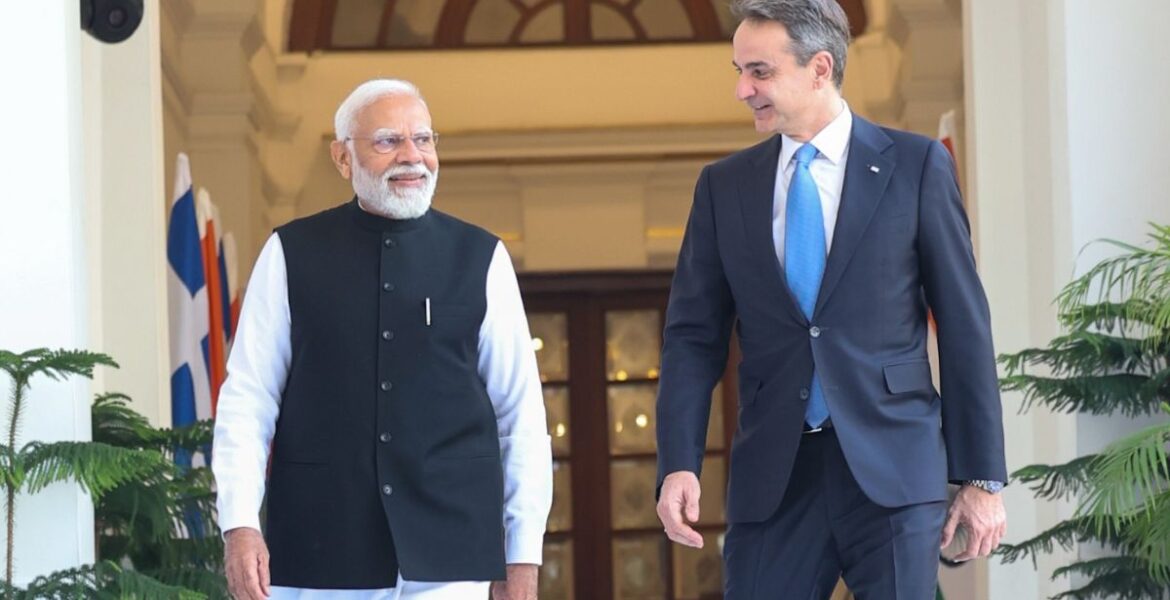The countries' leaders have announced plans to showcase the two nations' shared heritage and the most practical achievements of their diplomatic cooperation.
After the visit of Greek Prime Minister Kyriakos Mitsotakis to India in February, the two countries are discussing strengthening their bilateral ties. His trip followed Indian Prime Minister Narendra Modi's visit to Athens in August 2023, where both governments agreed to upgrade their cooperation to a strategic partnership.
Kyriakos Mitsotakis is the first Greek head of state to visit India in 15 years, indicating the extent to which the bilateral relationship has strengthened over the past year.
Greece is commonly referred to as the 'gateway' to Europe, while India is the strongest economy in South Asia, so cooperation between these states can promote connections between the regions. Many economic and diplomatic incentives, such as the India-Middle East Economic Corridor (IMEC), can strengthen their relationship and overcome challenges for effective cooperation.
A key aspect of the recent India-Greece bilateral meeting was the viability of IMEC, which the G20 members first launched during their annual summit in New Delhi last year. The economic corridor aims to revolutionise trade routes from India to Europe, using the Middle East and Greece as central corridors.
When G20 members first proposed IMEC, negotiations were underway to normalise diplomatic relations between Saudi Arabia and Israel. These were seen as critical to the corridor's viability, as the planned route would pass through both nations, using the ports of Haifa in Israel and onwards to Piraeus.
Since the outbreak of war in the Middle East, many have considered this project to be "dead."
However, the revival of talks between Modi and Mitsotakis in February 2024 is notable, given their role as leaders of two critical IMEC member nations. Greece and India claim they are confident the project is still viable and have pledged to do whatever is necessary to ensure its implementation.
Both countries desire to create an effective alternative to China's Belt and Road Initiative (BRI). One way India and Greece can help make IMEC a successful and worthy competitor to China's BRI is by acting as third-party mediators between Saudi Arabia and Israel.
Such a sensitive engagement could create a foundation of mutual understanding between the two, allowing IMEC to move forward, as the economic incentives that motivated these countries to sign the IMEC agreement last year still exist.
Strengthening other areas of the relationship
Although India and Greece need to reach a consensus under IMEC to develop the transport routes linked to the agreement, they can still work to strengthen their own trade relationship.
Both governments set it in motion by drafting a partnership agreement aimed at doubling their bilateral trade from nearly $2 billion in 2022-2023 to $4 billion by 2030, even without IMEC.
During bilateral talks, Modi also agreed to support Greece in the Eastern Mediterranean. Given the recent strained relations between India and Turkey, it seems logical that India would use this opportunity to strengthen its relations with Greece.
Turkish President Recep Tayyip Erdogan has expressed his opposition to India's abrogation of Article 370 and has also invested in defence cooperation with Pakistan. India cut its defence exports to Ankara in 2019, and Modi cancelled his only planned visit to Turkey that year because of Erdogan's remarks on Kashmir.
Another important aspect of the India-Greece partnership concerns the UN Security Council. India has long argued that the UN needs urgent reform to reflect the geopolitical realities of the modern world.
In bilateral talks held in February 2024, Greece agreed to join India in committing to UNSC reform and pledged to support India's bid for a permanent seat on the council. This development is a moment of great symbolic importance, with Greece directly supporting India's rise to the world stage.
Finally, while there are many economic and geopolitical incentives to strengthen their relationship, the rich histories, cultural connections, and interpersonal ties between India and Greece are also critical foundations for the bilateral relationship.
Modi and Mitsotakis acknowledged this history during speeches in August 2023.
The Greek prime minister described the "ancient trade routes and the path of Alexander the Great" that formed some of the earliest connections between the two nations, while Modi discussed the importance of both Greece and India.
Additionally, in January 2024, researchers in Vadnagar, Modi's hometown, discovered artifacts from the era of the Indo-Greek king Apollodatus through excavations. Apollodatus ruled during the Greco-Bactrian Kingdom, which included many small villages of Greeks who had settled in northwestern India and merged into Indian culture, establishing a collective Indo-Greek identity.
This recent archaeological discovery can be an ideal opportunity for India and Greece to deepen their historical and cultural relations.
Kyriakos Mitsotakis has spoken of Greece's relationship with India as "a partnership between the world's oldest democracy and the world's largest democracy," highlighting a key historical and ideological connection between the two nations.
Next year will mark the 75th anniversary of diplomatic relations between India and Greece.
The countries' leaders have announced plans to use the event to showcase the two nations' shared heritage and the more practical achievements of their diplomatic cooperation.
Strengthening cultural ties alongside joint efforts on geopolitically beneficial projects such as IMEC or the potential new India-EU Free Trade Agreement will be a substantial synergy to create a deeper and lasting relationship between the two nations.
READ MORE: Greek-Owned Oil Tanker Hit by Houthis in the Red Sea.


